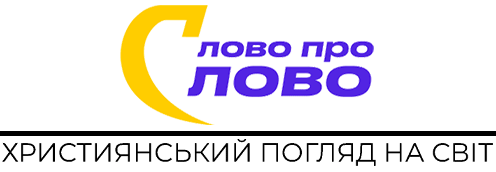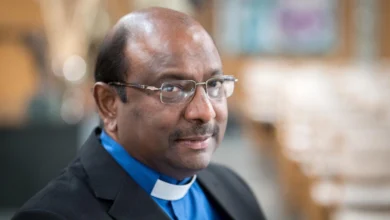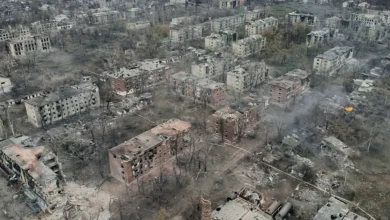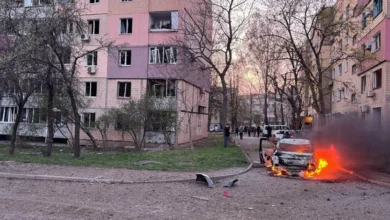Blood screams through the language of neutralization…

Two days to seven months since Andriy was fatally wounded… Who is able to hear the cries of the families of the dead, the missing, those in Russian captivity? The cry of families divided by war: those who had to flee the war and those who stayed behind? Who can feel the pain of millions?
Between work and volunteer trips, I occasionally visit the grave of my brother Andriy, who was killed by the Russians. His blood, as well as the blood of hundreds of thousands of our defenders and civilians, cries out from the ground, as Abel’s blood once did. It does not cry out for a “difficult situation” or “tragic circumstances” or “military conflict” – it cries out for the truth. And when I hear another international Christian organization talking about the “crisis in Ukraine” and the “suffering of the people,” as if this suffering came out of nowhere, like a natural disaster, I feel Andriy’s blood crying out for God’s truth louder than any theological diplomatic euphemism.
It is almost impossible for those who have not lived in Ukraine for these three years, who have not buried loved ones, who have not held the hands of the wounded, who have not evacuated and met elderly people from the occupied territories whose entire lives fit into one bag to truly understand the depth of this truth.
Not because there is a lack of empathy or compassion – they are often more than enough. But understanding of the truth comes only through experience – the experience of witnessing on a daily basis how the euphemisms of Christian leaders are shattered by the reality of rocket attacks, how “calls for peace” are drowned in the blood of innocents, how “prayers for all parties to the conflict” sound hollow over mass graves. This understanding cannot be conveyed through international conferences or seminars – it comes only through the experience of daily encounters with the truth, whose blood is screaming from the Ukrainian land.
Why is the language of truth so important?
Why is it not enough to simply recognize suffering, provide humanitarian aid, and pray for peace? Because theological language shapes the reality of the Church’s ministry. When we say “the situation in Ukraine” instead of “Russian aggression,” when we say “conflict” instead of “invasion,” when we use “challenges” instead of “war crimes,” we are not just choosing words. We are creating a theological reality where evil becomes anonymous, where responsibility is blurred, where truth dies in diplomatic formulations for the sake of the comfort of the aggressor and the “third partner party.”
There is a line where theological academic prudence turns into moral cowardice, where the diplomatic language of imaginary “missiological and ecclesiological” unity becomes complicity in a crime, where the desire to “maintain a dialogue” means betrayal of the truth. This line is drawn where the blood of the innocent cries out to heaven, and “some” try to drown out this cry with euphemisms for “balanced perspectives.”
In the context of the theology of the cross of Christ, which is increasingly being rejected by modern positivist and imperial evangelicalism in favor of a “positive and political” message, the question of language takes on a soteriological significance. When we refuse to call evil evil, when we hide the truth behind euphemisms, we do not just avoid conflict; we distort and destroy the very understanding of salvation, which comes precisely through the recognition of the truth, through calling sin sin, through specific repentance for specific crimes.
From the grave of Andriy… from the ruins of Mariupol… from the basements of Bakhmut… not only a cry of pain rises, but a theological question about the nature of Christian witness in a world where evil tries to hide behind the language of neutralization, where murderers hide behind the rhetoric of peace, where the devil himself, as always, disguises himself as an angel of light through the diplomatic formulations of Christian organizations…
Is it possible to serve the Truth through language that neutralizes this Truth?
When Cain killed Abel, God’s language was absolutely clear: Cain (the subject) killed Abel (the object). This grammatical precision reflects the very nature of God’s justice – there is one who does evil and one who suffers from evil. There is no “neutral territory” between the murderer and the murdered. God’s language has always been a language of concrete responsibility.
Unfortunately, today we see the largest Christian organizations consciously choosing the language of neutralization. Here are the words of Billy Graham, president of the Association: “The people of Ukraine are suffering” – as if this suffering had arisen by itself. “Our team has been there since the start of the war, caring for families impacted by the conflict” – the word ‘conflict’ hides a full-scale invasion, genocide, and war crimes.
“With millions living a nightmare – separated from loved ones, unsure what the next day holds” – but who created this nightmare? Who divided these families? Why are they afraid of tomorrow? The language of neutralization turns concrete crimes of concrete people into some abstract, subjectless disaster. [See the link in the first comment.]
This language of neutralization has a theological price. When we hear “the situation in Ukraine” instead of “Russian aggression,” “conflict” instead of “invasion,” “challenges” instead of “war crimes,” “Mariupol was destroyed” instead of “Russians destroyed Mariupol,” these are not just linguistic choices. These are theological decisions that reflect a willingness to betray the truth for the sake of imaginary peace and unity, based on the silence of the victim of aggression, not the truth.
Such language creates a theological reality where evil becomes anonymous, where responsibility is blurred, where truth dies in diplomatic formulations. This is reminiscent of Cain’s attempt to avoid responsibility by asking: “Am I my brother’s keeper?” Today this question sounds different: “How can we judge? Isn’t the situation complicated? Isn’t it better to remain neutral?”
However, Abel’s blood did not cry out from the ground about a “difficult situation” – it cried out about a specific crime by a specific murderer. And today, the blood of hundreds of thousands of Ukrainian Abels is crying out just as specifically. When Christian organizations hide behind the language of neutralization, they are not just choosing diplomatic language-they are complicit in an attempt to silence this cry, this voice of blood that demands the truth.
Thus, modern evangelicals (in Ukraine included) face an open question: is it possible to serve the Truth through a language that neutralizes this Truth? Is it possible to “serve all sides of the conflict” when one side is methodically destroying the other? By using the language of neutralization, do we not become complicit not only in concealing the crime but also in distorting the very nature of salvation and Christian witness in the world?
Is true Christian service possible without witnessing to the truth?
In the light of the theology of the cross of Christ (which is increasingly rejected by contemporary evangelicalism, unfortunately, for the sake of a “positive message of hope”), the truth about the language of truth is of soteriological importance. The Gospel does not simply say “Jesus died” – it clearly names by name those who betrayed, condemned, and crucified him. This is not just a historical detail; it is a theological principle: salvation comes through the recognition of a specific truth, through the naming of a specific sin, through a specific repentance.
The Gospel testimony shows us different types of reactions to evil: Peter, who initially denied it, but then found the strength to say, “You have crucified him”; Pilate, who tried to remain neutral by washing his hands; the chief priests, who called the murder of an innocent “necessary for the people.” Today we see the same types of reactions to Russian (and other) aggression in the international Christian community.
Yes, one can be an accomplice to the crucifixion and sincerely give a sip of water to the cross, deliberately silencing the crucifixion itself and emphasizing the fact of humanitarian aid. This is what Russian evangelical Christians do when they emphasize: “We also serve Ukrainian refugees!” But is this the kind of witness Christ calls us to? When the first Christians testified to the resurrection, they did not say “there was a difficult political and religious situation with Jesus.” They directly accused: “You crucified him with the hands of the lawless” (Acts 2:23).
The price of true witness is always high. Just as the apostles risked everything by naming those responsible for the crucifixion of Christ, so today international Christian organizations risk losing access, funding, and partnerships. But can we call ourselves Christ’s witnesses if we are afraid to be witnesses to the truth? Christ said: “I was born and came into the world to bear witness to the truth” (John 18:37).
The theology of the cross requires us not only to recognize suffering, but also to name those who caused it. When Christian leaders and institutions abandon this witness for the sake of institutional comfort or “preserving ministry opportunities,” they betray not only the victims of violence, but the very essence of salvation and Christian vocation in the world.
Is true Christian service possible without witnessing the truth? Doesn’t our humanitarian aid turn into an attempt to pay off the responsibility to bear witness? Of course, humanitarian aid is very necessary! But it should not be the price of silencing the crucifixion… Just as Pilate tried to pay off his responsibility by washing his hands, aren’t we trying to pay off our responsibility to bear witness with humanitarian projects and prayers for peace without naming the aggressor?
The theology of the cross reminds us that there can be no reconciliation without truth, no forgiveness without confession of sin, no healing without naming the disease. And when we choose the language of neutralization instead of the language of truth, we do not bring reconciliation closer, we make it impossible.
Is it possible to remain neutral when the blood of the innocent cries out to heaven?
The prophetic tradition of the Old Testament shows us that God values frankness and honesty more than polished theological, missiological, and ecclesiological diplomacy. He chooses the uncomfortable Amos instead of the moderate temple priests, the “extreme” Jeremiah instead of the balanced religious leaders, the “unbalanced” Ezekiel instead of the calm theologians. Why? Because their “unacceptable” language carried more truth than the diplomatic statements of some religious institutions.
When Jeremiah mourned the ruins of Jerusalem, he did not limit himself to general phrases about the “tragic situation.” He specifically mentioned: “Babylon has destroyed,” ‘the Chaldeans have burned,’ and ”the enemies have mocked.” His lament was not just an emotional outpouring; it was a theological testimony that combined pain with the accuracy of accusation. Today, when we stand among the ruins of Mariupol or Bakhmut, the voice of Jeremiah shouts to us: true testimony requires specificity!
Instead, the modern “diplomatic” language of many international Christian organizations offers us a different path. “We pray for all parties to the conflict,” ‘we call for dialogue,’ ‘we avoid political assessments’ – these formulations look wise and balanced, but like the five virgins without olive oil, they are empty. Do they not remind us of the temple prophets who prophesied “peace, peace” when there was no peace? Do they not repeat the mistake of those who tried to maintain a “balance of perspectives” between Egypt and the enslaved Jews, between Babylon and the destroyed Jerusalem?
The price of such neutrality is terrible. When international Christian organizations refuse to call the aggressor an aggressor, they are not just choosing diplomatic language; in the twenty-first century, they are complicit in covering up the crime of the largest full-scale war on the European continent since World War II. Their silence about the specific perpetrators of the suffering of the Ukrainian people is not neutrality, it is complicity. As Elie Wiesel said: “We must take sides. Neutrality helps the oppressor, never the victim. Silence supports the executioner, never the one who screams in pain.”
But the price of a true, prophetic testimony is also high. Jeremiah was called a traitor, Amos was exiled, Ezekiel was considered a madman. Today, some of our partner Christian organizations that dared to call Russian aggression aggression risk losing “access to all parties to the conflict,” the possibility of “humanitarian service,” and “dialogue with the Russian church.” And some try to serve simultaneously in “two perspectives.” However, does this not remind us of buying temporary comfort and relationships with Cain’s friends at the cost of betraying the truth about Abel?
We are faced with a fundamental theological question: Is true Christian service possible without prophetic witness? Is it enough to simply “help the victims” without naming those who caused their suffering? Is it possible to remain neutral when the blood of the innocent cries out to heaven?
The prophetic tradition gives us a clear answer: God is not neutral with regard to evil. He is not looking for a “balanced approach” between victim and executioner. He requires specificity in testimony, precision in naming the crime, and clarity in determining responsibility. And if we want to be faithful to this tradition, we cannot hide behind theological diplomatic “missiological” euphemisms when blood and truth cry out for testimony…
Where was your voice when the blood of Ukrainians was crying out?
Today, when blood is crying out not only from the Ukrainian soil, but also from many other “conflict zones” where Christian organizations are “sharing the Gospel,” we face a fundamental theological challenge. When we refer to genocide as a “humanitarian crisis,” mass murder as a “difficult situation,” and war crimes as “challenges,” we are not just choosing diplomatic language; we are making a theological choice about the nature of truth and witness. The question “Where is your brother?” is still being asked wherever the blood of innocents cries out to heaven, and Christian institutions hide behind euphemisms for “peacemaking” and “neutrality.” God did not accept Cain’s evasive answer “Am I my brother’s keeper?” and He will not accept our complicated “theological and missiological” diplomatic formulations about the “complexity of the situation.” For Truth and truth, like God, requires specificity – not for the sake of conflict, but for the sake of the possibility of true reconciliation, which is possible only through the recognition of reality in God’s language
One day, everyone who chose the language of neutralizing evil for the sake of “preserving opportunities for ministry” will face the question not of the effectiveness of their missionary strategy, but of their fidelity to the vocation to be witnesses to the One who came into the world “to testify to the truth” – even if this truth cost Him… His life? The question will be simple and terrible: “Where was your voice when the blood of Ukrainians was crying out? Why did you call the Ukrainian genocide a “conflict”? Why did you talk about the ‘impact of the situation’ instead of calling Russian murderers murderers?”








